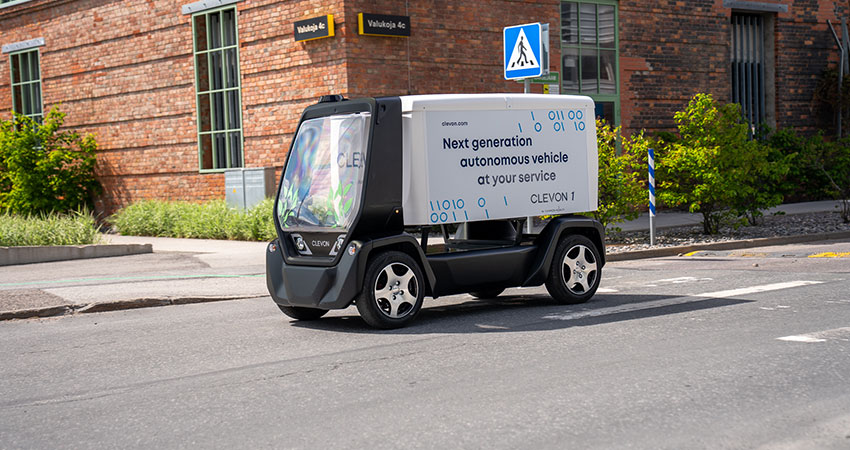Clevon, which makes self-driving cars designed to drive on city streets rather than sidewalks like most other vehicles, has opened a U.S. office in Fort Worth, Texas, to kick off a planned expansion, with the company’s CEO saying a number of big-box retailers and delivery companies have expressed interest.
The company was spun off from Estonian automated logistics provider Cleveron in March this year and is listed on Nasdaq’s North Baltic Exchange.
Crevon’s self-driving vehicles are smaller than a compact car but bigger than cooler-sized delivery robots like fellow Estonian company Starship. They have been in commercial use in European city centers since early 2020, making them the first company to receive such certification. Crevon has partnerships with logistics companies La Poste/DPD and DHL Express, as well as Lithuanian grocer Iki. The company claims its zero-emission vehicles will cut last-mile costs by 30%.
The Clevon 1 platform combines cameras and radar from technology partners such as Nvidia and Toshiba to provide data for mapping and guidance, similar to the technology Tesla uses in its self-driving cars. The vehicles can be programmed to pick up orders at warehouses, retail stores, dark stores and MFCs and deliver them to end customers, serving four to five households per delivery.
Cleavon CEO Sander Sebastian Agar said the company is working towards achieving fully autonomous driving in enclosed environments. Currently, supervisors in a network operations center continuously monitor vehicles on public roads, communicate with them and take over control. “Safety is paramount,” Agar said.
Clevon’s autonomous platform comes in a variety of form factors depending on business needs and product type, including retail cargo boxes, lockers, and small truck beds. Maximum payload is 200 pounds, with the largest box being 1.5 cubic meters. The vehicle has a top speed of 32 mph, but is typically kept below 25 mph for safety reasons. It has a range of approximately 62 miles on a single charge, with most urban delivery operations occurring within a 5-10 mile radius.
Agar said the company is working with local governments and lawmakers in the Dallas-Fort Worth area to secure the necessary approvals to conduct proof-of-concept testing on local roads. Agar said the company has 10 projects in the works with retailers and logistics companies by the end of 2023, with mass production and commercial service expected to begin the following year.
He said DFW was chosen as the launch site because of its access to talent and the region’s suitability for autonomous driving through the AllianceTexas Mobility Innovation Zone, an environment that other companies taking advantage of include FedEx and Aurora and Ryder and Gatik’s autonomous middle-mile partnership.
“Right now we are recruiting in the U.S. for business development, software and hardware engineers, sales and marketing, and DFW will be there to step in,” Agar said. “Manufacturing will remain in Europe, but we will establish a base here and once order volume increases, I think we will set up an assembly plant in the U.S. as well. In the long term, it doesn’t make sense to ship cars to the U.S.”
Agul said Crebon has raised €12 million in total, noting that the company is running a lean and efficient operation given the capital required to operate self-driving cars, adding that the next round of funding is underway. He noted that Estonia has the most tech startup unicorns per capita in the world, and that Estonian President Aral Kallis attended the launch in the US last week.
“Self-driving cars are both a future technology and a current technology that companies are already using,” he said. “They’re no longer a concept. There will only be more resources in the future, and the adoption of self-driving cars will accelerate.”

